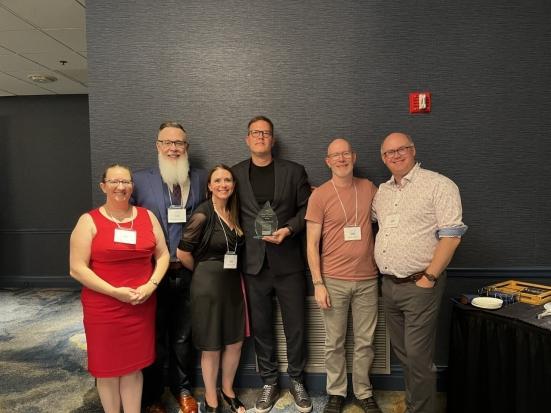Dr. Martin Harbusch receives award in Chicago

Deputy Prof. Dr. Martin Harbusch (4th from left) at the award ceremony in Chicago with (from left): Prof. Dr. Lisa-Jo van den Scott (Memorial University, Canada), Prof. Dr. Christopher J. Schneider (Brandon University, USA), Prof. Dr. Stacey Hannem, (Wilfrid Laurier University, Canada), Prof. Dr. James Patrick Williams (Nanyang Technological University Singapore) and Prof. Dr. Jeffrey van den Scott (Memorial University, Canada).
Dr. Martin Harbusch from the University of Siegen was the first European scientist to receive the "Kathy Charmaz Early-In-Carrer Award" from the Society for the Study of Symbolic Interaction (SSSI) in Chicago. This is an international science prize that recognizes the achievements of scientists in the career phase up to ten years after their doctorate for promising achievements in the field of symbolic interactionism. The SSSI is effectively the successor to the Chicago School - an important scientific community in 20th century social research.
"As a social researcher, it is therefore a special honor for me to receive this award in Chicago," explains Dr. Martin Harbusch. "For me, this award is the most important recognition of my work to date. I am delighted that my publications have also aroused international interest in the research world." Dr. Martin Harbusch has taken over the position of Professor of Methods in Empirical Educational and Social Research at the University of Siegen this year.
Kathy Charmaz was an American sociologist. After her death in 2020, the "Early in Career Award" was named after her. Her work was formative for "grounded theory", an important methodology in qualitative social research. "Roughly speaking, interactionism is about how people communicate with each other and negotiate their respective realities in social situations," explains Harbusch. "In recent years, I have been interested in the question of how social workers deal with psychiatric categories in counseling centers, for example." This is interesting in terms of the sociology of knowledge, as social workers and other professionals from the social sector have a major influence on public perception and forms of communication of social problems. On the one hand, they are not experts in the field of psychiatry. On the other hand, they interpret people's problems and behavior as difficult or socially irritating in counseling sessions, express suspicions of a mental disorder and then send people to doctors. "I have spoken about these connections and the resulting problems for social institutions, specialist disciplines and the people affected several times at the SSSI conference in recent years," says Harbusch. The fact that the lectures and discussions have drawn attention to his work and that he is now receiving this award is as gratifying as it is surprising and means a lot to him.

